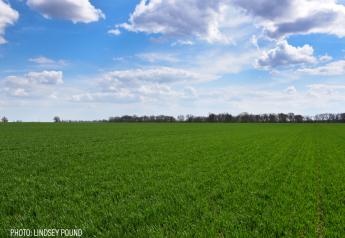First Thing Today | March 22, 2022

Wheat again leads price gains overnight... Global supply concerns amid the ongoing war between Russia and Ukraine fueled active followthrough buying in grain and soy markets overnight. As of 6:30 a.m. CT, winter wheat futures are trading mostly 38 to 45 cents higher, spring wheat is 30 to 32 cents higher, corn is 3 to 5 cents higher and soybeans are 12 to 15 cents higher. Front-month U.S. crude oil futures are trading near unchanged after topping $115 earlier overnight, while the U.S. dollar index is around 150 points higher this morning.
Russia/Ukraine update... Peace talks resumed between the two countries but there is no sign of significant progress. The battle for Ukraine’s strategic port of Mariupol continues, as Ukraine rejected a Russian offer to evacuate its troops from the besieged city. Ukrainian President Volodymyr Zelenskyy said it would not be possible to negotiate an end to the war without a nationwide referendum and a meeting with Russian President Vladimir Putin. Ukraine’s military warned the public of more indiscriminate Russian shelling of critical infrastructure as U.S. President Joe Biden issued one of his strongest warnings yet that Russia is considering using chemical weapons. Russian troops have failed to capture any major Ukrainian city more than four weeks into their invasion, and increasingly are resorting to massive destruction of residential areas with air strikes, long-range missiles and artillery. Meanwhile, the European Union cannot agree on whether or how to impose sanctions on Russia's lucrative energy sector, though support for a European Union-wide ban on the purchase of Russian oil is growing inside the bloc. Russian energy giant Gazprom said on Tuesday it was continuing to supply gas to Europe via Ukraine in line with requests from European consumers.
Fallout from Russia’s invasion of Ukraine is already threatening global food supplies... Ukrainian crops from last year’s harvest are locked down in warehouses behind Russian battle lines, the Wall Street Journal reports, and farmers face the loss of wheat that is already in the ground and corn crops later this year because they can’t get needed materials. The war has disrupted Ukrainian agriculture, triggering higher prices and the threat of global shortages to countries that rely on the country’s commodities. Much of the country’s exports go to developing economies already struggling with rising food costs. Russia’s naval blockade has cut off shipping exports, but Ukraine is shipping some goods through Western borders by train. Adding to the global woes, Russia is also struggling to get its crops through the Black Sea. By one estimate, the country’s grain shipments are down 60% from normal levels.
Biden sees risk of cyberattack on critical infrastructure... Biden warned Monday about new indications of possible Russian cyberattacks in response to sanctions on Russia over its invasion of Ukraine. Biden’s warnings were prompted by what he called “evolving intelligence that the Russian government is exploring options for potential cyberattacks.”
Pre-war Russian fuel-oil cargoes sail for U.S. ports... U.S. ports are set to admit more Russian fuel oil than they’ve seen in eight months under contracts signed prior to the Biden administration’s ban on such shipments. About 9 million barrels of Russian fuel oil is scheduled to offload along the Gulf Coast and eastern seaboard this month, the most since July, according to oil-analytics firm Vortexa.
Powell comments on where to look to determine the chances for a U.S. recession... Some investors have been calling attention to a rapidly shrinking spread between two-year and 10-year U.S. Treasury yields to sound the alarm on a looming economic downturn. But Fed Chair Jerome Powell preferred a different measure of the yield curve that isn’t yet flashing a warning sign. “Frankly, there’s good research by staff in the Federal Reserve system that really says to look at the short — the first 18 months — of the yield curve,” Powell said. Meanwhile, President Emeritus at the Kennedy School of Government and former U.S. Treasury Secretary Larry Summers continued his criticism of Federal Reserve policy by calling the notion of the country having unemployment at 3.5% and sharply falling inflation for the first time “the triumph of hope over experience and analysis” in a series of tweets.
Worst Paraguay soybean crop in modern history... Farmers in Paraguay have completed their soybean harvest and according to the Soybean, Oilseed, and Cereal Produces Association of Paraguay, this turned out to be the country’s worst crop in modern history. As a result, South American Consultant Dr. Michael Cordonnier lowered high Paraguay soybean crop estimate by 1 MMT to 4 MMT. He left his production estimates unchanged for Brazil and Argentina. In Brazil, Cordonnier estimates production at 123 MT for soybeans and 112 MMT for corn. In Argentina, he estimates production at 39 MMT for soybeans and 49 MMT for corn.
Argentina extends Parana River emergency declaration... The Argentine government extended the State of Emergency for the Parana River for 90 days. The original declaration was for 180 days and it was set to expire at the end of this month. Dryness in the Argentine provinces of Formosa, Chaco, Corrientes, Santa Fe, Entre Rios, Misiones and Buenos Aires, along with dryness in Paraguay and southern Brazil, has led to the lowest water levels in 78 years. A big issue for agriculture is the low water levels at the ports near Rosario, which is responsible for approximately 85% of Argentina’s ag exports.
GOP Covid funding objections linger... Republicans still haven’t gotten the accounting they’re seeking regarding the White House’s request for more Covid-19 funding, Senate Appropriations Vice Chairman Richard Shelby (R-Ala.) said, adding he wants details on how much previously appropriated money remains unspent. The White House sent a statement on the matter but not a full accounting, he said. “We don’t know if there’s a need there,” Shelby noted. “Some people say we’re going to have another wave of Covid. If we do, we’re going to have to deal with it. Is it going to be benign or is it going to be lethal? We don’t know that. All we’re looking for is data.”
SEC releases climate disclosure rule... Companies will need to reveal detailed information about their greenhouse gas pollution under a new U.S. Securities and Exchange Commission (SEC) plan, a major shift in how corporations must show they are dealing with climate change. The rule would for the first time require businesses to outline the risks a warming planet poses to their operations when they file registration statements, annual reports or other documents. Some large companies will have to provide information on emissions they don’t make themselves but come from other firms in their supply chain. Opponents argue the regulations are outside the SEC’s jurisdiction. Proponents say the public needs the information to make informed decisions. Companies and other stakeholders have 60 days to comment on the SEC’s draft rule.
Little change in CFAP payouts... Payments under the Coronavirus Food Assistance Program 1 (CFAP 1) were actually down slightly as of March 20, with total CFAP 1 payments at $11.82 billion ($11.83 billion prior) and original CFAP 1 payouts are at $10.63 billion ($10.64 billion prior) while top-up payments were steady at $1.19 billion. CFAP 2 payments held steady at $19.17 billion for total payments, $14.34 billion for original CFAP 2 payments and $4.83 billion in top-up payments.
HPAI cases hit 50... Confirmed cases of highly pathogenic avian influenza (HPAI) stand at 50 with additional finds in commercial poultry operations and backyard flocks, according to USDA’s Animal and Plant Health Inspection Service (APHIS). The finds are also in states where HPAI has been previously confirmed. New cases were confirmed commercial operations in Kingsbury County, South Dakota (39,000 turkeys), Hanson County, South Dakota (20,233 turkeys), Hutchinson County, South Dakota (49,000 turkeys), Buena Vista County, Iowa (confirmed March 17 in layer operation with 5,347,511 birds), Cecil County, Maryland (confirmed March 18 in flock of 315,000 pullets), and Kent County, Maryland (confirmed March 17 in 156,800 broilers). Backyard flock confirmations have been made in Dickenson County, Kansas; Rockingham County, New Hampshire; Lincoln County, Maine; Knox County, Maine; York County, Maine; and Warren County, Iowa. Of the 50 cases, 27 have been in commercial poultry operations in seven states.
Delayed cash cattle trade likely... Cash cattle trade averaged $139.10 last week, up 80 cents from the previous week, and traders generally have bullish hopes for this week’s cash market. That should help limit seller interest in cattle futures as traders wait on active cash trade to develop. With USDA’s Cattle on Feed Report out on Friday afternoon, there’s a strong likelihood the bulk of this week’s cash trade will be pushed deep into the week, possibly until after the report.
Cash hog index rises... The CME lean hog index is up 44 cents today (as of March 18) to $101.80, the third straight day of gains and the highest price since last August. Even with Monday’s strong gains, April lean hog futures still finished more than $1 below the cash index, suggesting followthrough buying is possible if not probable today.
Overnight demand news... Exporters reported no tenders or sales overnight.
See ‘Policy Updates’ for late-breaking morning news updates... For updates to items in “First Thing Today” or any late-breaking morning news stories, check “Policy Updates” on www.profarmer.com.
Today’s reports
- No USDA reports scheduled






